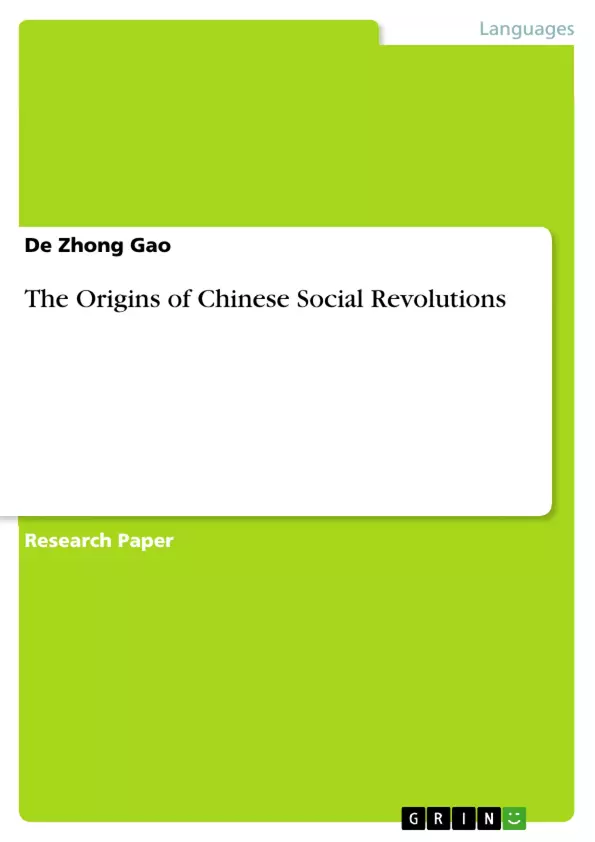Calling for public support and mobilization are generally considered taboo in authoritarian regimes. Yet, during the course of his February 1989 visit to Ukraine, Gorbachev (1931- ) appealed to his public supporters to help fight the enemies of reform and accelerate political and economic reformist programs, “You keep up the pressure. We [the Party] will press from the top, and you keep pressing from the bottom. Only in that way can [social transformations such as] perestroika succeed.” This essay argues that in China, social transformations originate from the mass peasantry, but in order for social transformations to be effective, they need to be transformed into political dogma through effective leadership and party organization. The Rousseauist belief that the “goodness of simple men” can change mankind is not sufficient to revolutionize society, and rule out or alleviate the unilateral class divisions of the old régimes. This essay aims to analyze the role of leadership and the role of the masses in producing social changes in China and addressing regional concerns, and compare the French, Russian and Chinese revolution—of 1949—to illustrate how social transformations are sustained through the coordination of the leadership and mass mobilization. Finally, this essay will also examine how social transformations in China today have exclusively become an affair of party elites, casting aside the role of the masses in social revolutions. [...]
Inhaltsverzeichnis (Table of Contents)
- Introduction
- The Role of the Masses in Social Transformations
- The May Fourth Movement and Mass Mobilization
- The Power of the Masses in History
- The Importance of Leadership and Organization
- The Role of the Party in Social Transformations
- The CCP's Role in Transforming Ideas into Action
- The Process of Specification and Implementation
- Challenges in Implementing Communist Ideology
- Conclusion
Zielsetzung und Themenschwerpunkte (Objectives and Key Themes)
This essay analyzes the role of leadership and the masses in driving social change in China, particularly during the 1949 revolution. It examines the French and Russian revolutions in comparison to illustrate how social transformations are sustained through a combination of leadership and mass mobilization. The essay also explores the shift towards party-led social transformations in modern China, where the role of the masses has diminished. Key themes include: * **The significance of mass mobilization and revolutionary fervor in social change** * **The role of leadership and party organization in channeling and guiding the masses** * **The impact of communist ideology on social transformations in China** * **The evolving role of the masses in social change** * **The challenges and complexities of implementing communist ideology in diverse contexts**Zusammenfassung der Kapitel (Chapter Summaries)
The introduction sets the stage by discussing the historical context of social revolutions and the significance of both mass mobilization and leadership in achieving social change. It emphasizes that the masses, while possessing the potential for transformative action, require leadership to guide and unite them.
The second chapter delves into the role of the masses in social transformations. It highlights the impact of the May Fourth movement in China, where intellectuals emphasized educational reforms and mobilizing the peasantry to fight against foreign exploitation. The chapter further examines the historical significance of mass uprisings in revolutions, citing the French Revolution and the Bolshevik Revolution as examples.
The third chapter focuses on the crucial role of the party in social transformations. It explores the Chinese Communist Party's (CCP) approach to transforming socialist ideals into systematic policies and implementing them through the process of specification and implementation. It further examines the challenges faced by the CCP in enforcing communist ideology in remote and diverse regions of China.
This preview does not include summaries of the final chapter or the conclusion to avoid spoilers.
Schlüsselwörter (Keywords)
The main keywords and focus topics of this essay are: social revolutions, mass mobilization, leadership, party organization, communist ideology, China, French Revolution, Russian Revolution, May Fourth Movement, peasant movement, Great Leap Forward, implementation, specification, and the role of the masses in social transformations.Frequently Asked Questions
What is the central argument regarding social transformations in China?
The essay argues that while social transformations often originate from the mass peasantry, they must be transformed into political dogma through effective leadership and party organization to be successful.
How does the Chinese revolution compare to the French and Russian revolutions?
The essay uses these comparisons to illustrate how social transformations are sustained through the coordination of top-down leadership and bottom-up mass mobilization.
What was the role of the masses in the May Fourth Movement?
Intellectuals in the May Fourth Movement aimed to mobilize the peasantry and emphasize educational reforms to fight foreign exploitation and initiate social change.
What challenges does the CCP face in implementing communist ideology?
The Chinese Communist Party faces difficulties in enforcing systematic policies across remote and diverse regions, requiring a complex process of specification and implementation.
How has the role of the masses changed in modern China?
The essay examines how social transformations in contemporary China have increasingly become an affair of party elites, potentially diminishing the active role of the masses.
- Arbeit zitieren
- De Zhong Gao (Autor:in), 2012, The Origins of Chinese Social Revolutions, München, GRIN Verlag, https://www.grin.com/document/193036



